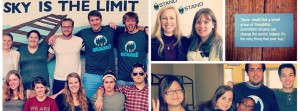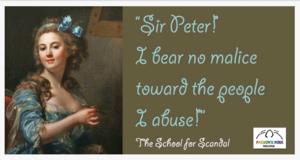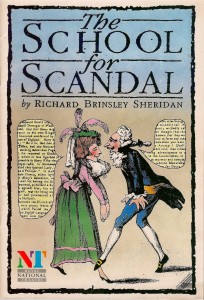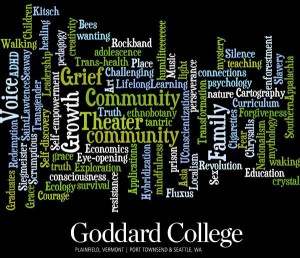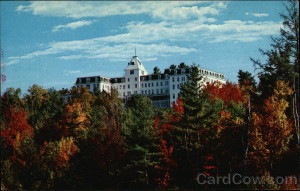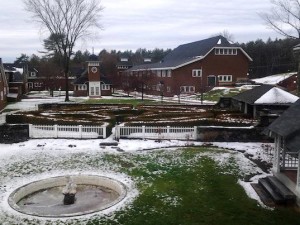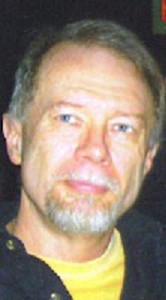Quinsig was a direct stepping stone to UWW, though I didn’t know it then. I was busy learning two jobs that were brand new to me, applying what skills I had while learning new ones. I had bookkeeping and auditing skills, which kept me out of trouble and gave me credibility with the Administration. I had a sense of humor and could talk with most anybody about most anything, which gave me credibility with the students. But having little experience, I knew almost nothing about organizations and leadership. Turned out, it was my job to know them.
The new Dean of Students had a mind to start over again in Student Activities, and so he had me work with students to rewrite (for the Senate’s approval and his) the entire Student Association By-Laws, now to include in their purview the student programming organizations, student governance, and intramural sports, all of which I advised directly – along with the clubs, the student newspaper, and intercollegiate sports, which all had their own faculty advisers, but whose budgets the Student Senate funded and I supervised.
As the new President and Dean set about getting rid of more second tier administrators (the Director of Admissions was soon gone as well), Rich saw an opportunity for reorganizing there, as well. So he set me to interviewing his directors and rewriting the mission/descriptions for each area and department as well as for the entire Student Affairs area. This was my introduction to the field of Higher Education Research, Policy, and Administration; years later, I was to receive my EdD in it through the UMass School of Ed. I learned to write vertically integrated mission statements and program goals, and work up both classic and matrix organizational charts. I grew expert at putting things in neatly labeled boxes, arranged just so. The missions and descriptions I wrote for Student Activities and Student Affairs became the basic content for the new QCC Student Handbook, which became The Footbook, which I’ll get back to later.
As I was writing and rewriting mission statements, the Dean further engaged me in a re-thinking of the mission of Student Activities itself and how it fit with the mission of Student Affairs and the College as a whole, which is when he truly became my first mentor. He described two ways of thinking about Student Affairs, the traditional, reactive “service” model and the re-envisioned, proactive (first time I heard that word) “student development” model. As illustration, he mentioned the outgoing Director of Financial Aid, who habitually sat in his office reading the paper till a student came knocking on his door with some Finaid problem his secretary couldn’t solve. I had a problem with his attitude myself, as did students. Rich saw it as simply the old school and outmoded “service” model: reactive, patronizing, and ineffective. “You need us, we’ll see what we can do.” Like the custodial staff.
Rather than sit there, he said, Finaid should be getting the word out that financial aid is available for working adults and that there are many scholarships out there no one’s even applying for. They should be running workshops to help students fill out and submit the forms. They should be reminding them of the deadlines to apply. They should be reaching out, he said, not waiting for students to reach them, and making sure they had the tools to succeed. “That’s the “student development” model”. He said that Student Affairs as a whole needed to switch from the service model to the student development model to align itself with the mission of the College, which is educational. And there was the Big Picture. This was philosophy, educational philosophy, applied, the way I like it; I’d hungered for a way to make comprehensive sense of this new environment beyond just the ideas I had for it. Now it clicked.
Student Activities, he continued, was traditionally geared to providing “bread and circuses” (beer-blasts and baseball, at QCC) to divert and pacify restive, residence hall students. Thanks to its commuting students, that’s not a community college problem, Rich pointed out. But the model was carried over anyway in most community colleges. Student Activities was funded to provide “extra-curricular” activities and entertainments, called that because they were outside the instructional program of the school, serving a different purpose vaguely described as “school spirit” and “healthy outlets”. But it’s mostly give them what they want: the service model. Only, if you asked students what they wanted from their student activities fee, most would have said they wanted their money back. Rich was right: they didn’t need entertainment. So why have Student Activities?
Because there’s the extra-curriculum, Rich said, and then there’s the co-curriculum, which falls under the educative mission of the institution, where all of Student Activities should be. The student newspaper, which was advised by the prof who taught our Journalism classes, was a good example of a co-curricular activity. It was a way for students to learn journalism by doing it – experiential learning. And that was the student development model, emphasizing activities that developed student skills and empowerment, ideally in collaboration with the classroom. I was right with him on all that, but the dirty little secret of Student Activities was that our most popular activity was beer blasts. They seemed as fundamental to our Activities program as the dirt beneath our feet and about as uplifting. “So what about beer blasts,” I asked him? With just the trace of a smile, he said “we need to help students learn to drink responsibly.” Could he possibly mean that? How? I was wide-eyed by then and my head was buzzing.
He liked my ideas for turning Student Activities into a job-training program, but encouraged me to focus on developing students’ leadership abilities and their understanding of group dynamics, as that’s what they’d be doing in Student Activities, mostly – generic skills which all the student leaders could stand to learn. And he said I should get more faculty involved. He gave me a book to read by Terry O’Banion, for many years the President of the League for Innovation in the Community College and one of its foremost thinkers. Later, he helped me develop and deliver “Leadership Overnight” workshops, with exercises I’m still drawing on, and even an overnight personal growth workshop.
While these did help students become more aware of how they worked with and related to others, what they did most was bond the student leaders. They came to understand what their roles were in the grand scheme of Student Activities and how they could work together on major events, like Spring Arts Week, and support one another. And so they became part of something bigger than just their own organization or club. The Student Association became more than an organizational abstraction; it became something to be part of, as its parts, its member organizations, learned to work together and their leaders became friends.
And the student leaders became more effective as they went along if only because they stuck with it – they were developing! And so we managed to make Student Activities into a solid co-curricular program by keeping the fun in it. Only now the fun was in the organizing, in the social process, the team effort, as well as in the product at the end – the entertainment.
And so it grew. Many older students started getting involved. They’d see me in the hall or at an event, come over and ask “why don’t you ever do this?” And I’d say “Great idea – why don’t you help make it happen?” They were vets, they were displaced homemakers, they were on MassRehab – they were lots of things, but they were generally capable adults, often better at organizing and leading than I was. They were often older than me too, so I listened respectfully. They were tired of rock-drenched beer blasts aimed at the younger students, tired of paying that fee for nothing, and wanted to do things more worth their while – they wanted more varieties of music and more films, they wanted someone invited in to talk about domestic violence, they wanted us to organize a long weekend trip to Montreal. I found I had a skill for recruiting folks to do things they already wanted to do – I was easily enthused by others’ energy and ideas, and amplified them. We wound up doing all these things, and each got new folks involved.
Students saw me as a peer because of my age, more their subordinate than boss: since they were paying the fees and volunteering their time, the least I could do was support them. They saw that I listened, that I respected them, and that they could trust me. I’d developed a style of servant leadership which enabled me to get out of their way and encouraged them to exercise their powers. I didn’t parade my authority and expertise about; I projected rather an air of good intentions overwhelmed, of someone in a bit over his head, which I was. They could see I needed help, and so they gave it – because I was just trying to help them, after all. I made friends with everyone. Somewhere in all that welter of people and groups, I’d quite forgotten the shyness I’d found so debilitating in my youth.
I’d come into Student Activities with a developmental, experiential educational approach that had grown into a philosophy of higher education that went beyond the classroom and would carry me into UWW. It was about giving students the tools to learn to do for themselves – it was about empowerment. But I’d learned that it was students coming together that truly released their power – and mine. And coming together required not just numbers in proximity but structure. We had a structure to work with now that gave us a unity of purpose and a common identity underneath all the disparate activities. We were building a student community.
This was a new experience for me, as I’d been an outsider growing up. I felt a sense of belonging for the first time in my life, satisfying a hunger I didn’t know I had as an only child with no extended family near, a latchkey kid growing up a goyim in a solidly Jewish neighborhood. All those lessons about education, organization, and leadership stayed with me and stood me well; but it was my new understanding of the strength in community that most intrigued me because it was so unexpected. It was to become the pivot on which my ideas about education would next turn. My ideas were growing and so was I, along with my program. I thought maybe I’d found my niche in life here at Quinsig. I thought less about my delusions of destiny with UWW. My calling had led me here, and that was enough.


